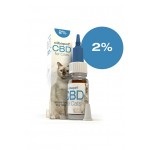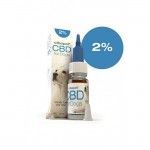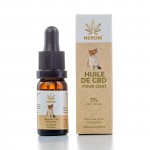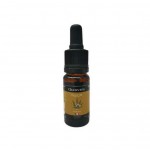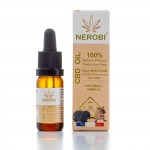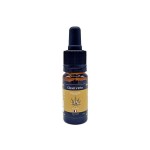CBD animal
6 products of CBD animalCBD Oil for Cats 3% - 10ml (Nerobi)
Nerobi - CBD Oil for Cats 3% - 10ml : A natural support for your cat's well-beingas early as 13,23 €CBD Oil 3% - Cat and small pet (Chanvreo)
Chanvreo - CBD Oil 3% for Cats and Small Pets: Natural support for their well-beingas early as 9,03 €CBD Oil for Small Animals 3% - 10ml (Nerobi)
Nerobi - CBD Oil for Small Pets 3% - 10ml : Natural support for the well-being of your small petsas early as 13,23 €CBD oil for dogs 4% - Broad Spectrum (Chanvreo)
Chanvreo - CBD Oil for Dogs 4% - Broad Spectrum : Natural support for your dog's well-beingas early as 11,13 €
Abbreviation for cannabidiol, theCBD is a substance found in hemp or Cannabis Santiva L. Unlike THC, which is responsible for the addiction and effects of drugs such as opium, ecstasy (MDMA), cocaine, morphine and heroin, CBD maintains the mental health of the person who uses it. But does this also apply to animals? Absolutely! Especially since the active ingredients of the molecule improve the life of animals, it is neither an illicit nor illegal drug. It is not dangerous.
How does the CBD work on animals?
CBD for animals works in animals in the same way as it does in humans. Animals, like humans, have receptors, including CB1 and CB2 receptors, to which cannabinoids bind. The receptor can be found everywhere in the body: in the central nervous system, in the skin, tissues, etc. The receptor can be found everywhere in the body. In principle, cannabinoids are produced in the animal body. However, it can happen that these substances are insufficient. In this case, the intake of legal animal drugs is beneficial
Is CBD beneficial on animals?
The CBD for animals has many advantages. This is why it is not subject to prohibition, like psychoactive substances in drugs. While drugs are physically addictive, CBD improves the health of the user. For example, in men, it makes withdrawal from drug addiction possible
The CBD intervenes in the fight against mental and psychic disorders in mammals. Indeed, it is one of the most effective antidepressants. In addition, its anxiolytic properties are advantageous. In addition to its neurological benefits, CBD for animals makes the healing of their wounds faster
Can side effects be observed?
Animal CBD contains little (0.2%) or no THC. This means that there is no risk of addictive behaviour or euphoria. As in humans, adverse effects are not noticeable in animals. However, the risks associated with an overdose are present. The following signs can be observed in mammals, whether dogs, cats or mice: drowsiness, dry mouth, headache, diarrhea, etc
On the other hand, although CBD for animals has multiple advantages, it should be remembered that it cannot be taken for drug substitution or drug treatment. The evidence is that while in humans methadone is a substitute for THC, CBD cannot be treated as such. That is why no one selling cannabidiol calls it a drug.
How to administer CBD to animals?
It is up to the client to choose the most appropriate method of administration for their pet to consume substances that are not addictive or psychotropic. There are two main options: oral or mixed with food.
If you choose the oral route, make sure the animal is calm when introducing the product into its mouth. It should be poured on the bottom gums or in the middle of the tongue. You can use a pipette for this purpose, especially if it is a CBD oil
The second solution for regular consumption is to dilute drops of animal CBD in water. Then the dog, cat, horse or mouse can drink it. Alternatively, you can also mix the product with his food before feeding it to the dog, cat, horse or mouse
What is the correct dosage of CBD for animals?
There are no predefined doses. They vary according to the metabolism of the animal. It's like with alcohol consumption, each man defines his tolerance. The principle remains the best way to administer CBD to an animal. In addition to taking into account the sensitivity of the animal, consider its weight and age. In any case, avoid giving it large quantities to rule out the possibility of intoxication. A veterinarian's prescription is useful to reduce the risk of overdose in case of excessive consumption.

